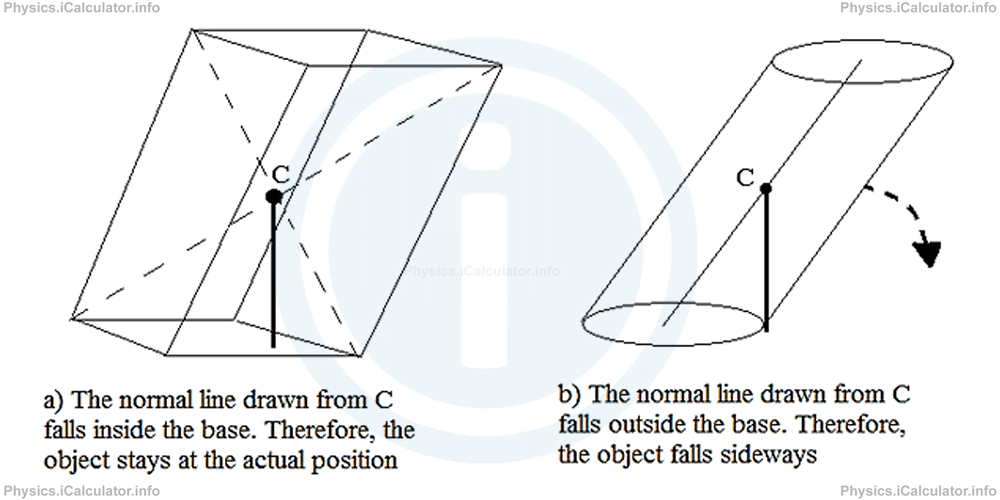Menu
Physics Lesson 6.1.4 - When Does an Object Start Falling Sideways?
Please provide a rating, it takes seconds and helps us to keep this resource free for all to use
Welcome to our Physics lesson on When Does an Object Start Falling Sideways?, this is the fourth lesson of our suite of physics lessons covering the topic of Centre of Mass. Types of Equilibrium, you can find links to the other lessons within this tutorial and access additional physics learning resources below this lesson.
When Does an Object Start Falling Sideways?
There are some examples in which objects are leaned but they still don't fall sideways (Leaning Tower of Pisa for instance). In other examples, objects start falling sideways despite they apparently seem at vertical position.
As long as the vertical line drawn from the centre of gravity falls inside the lower base of the object, it doesn't fall sideways. When the object leans at such an extent that the vertical line drawn from the object's centre of gravity falls outside its lower base, the object falls sideways. Look at the figure:

You have reached the end of Physics lesson 6.1.4 When Does an Object Start Falling Sideways?. There are 6 lessons in this physics tutorial covering Centre of Mass. Types of Equilibrium, you can access all the lessons from this tutorial below.
More Centre of Mass. Types of Equilibrium Lessons and Learning Resources
Whats next?
Enjoy the "When Does an Object Start Falling Sideways?" physics lesson? People who liked the "Centre of Mass. Types of Equilibrium lesson found the following resources useful:
- Sideways Feedback. Helps other - Leave a rating for this sideways (see below)
- Centre of Mass and Linear Momentum Physics tutorial: Centre of Mass. Types of Equilibrium. Read the Centre of Mass. Types of Equilibrium physics tutorial and build your physics knowledge of Centre of Mass and Linear Momentum
- Centre of Mass and Linear Momentum Revision Notes: Centre of Mass. Types of Equilibrium. Print the notes so you can revise the key points covered in the physics tutorial for Centre of Mass. Types of Equilibrium
- Centre of Mass and Linear Momentum Practice Questions: Centre of Mass. Types of Equilibrium. Test and improve your knowledge of Centre of Mass. Types of Equilibrium with example questins and answers
- Check your calculations for Centre of Mass and Linear Momentum questions with our excellent Centre of Mass and Linear Momentum calculators which contain full equations and calculations clearly displayed line by line. See the Centre of Mass and Linear Momentum Calculators by iCalculator™ below.
- Continuing learning centre of mass and linear momentum - read our next physics tutorial: Determining the Centre of Mass in Objects and Systems of Objects
Help others Learning Physics just like you
Please provide a rating, it takes seconds and helps us to keep this resource free for all to use
We hope you found this Physics lesson "Centre of Mass. Types of Equilibrium" useful. If you did it would be great if you could spare the time to rate this physics lesson (simply click on the number of stars that match your assessment of this physics learning aide) and/or share on social media, this helps us identify popular tutorials and calculators and expand our free learning resources to support our users around the world have free access to expand their knowledge of physics and other disciplines.